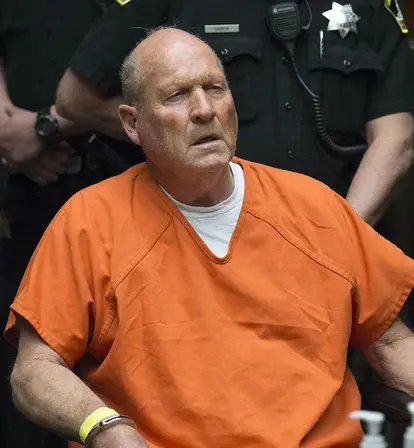From 1974 to 1986, the Golden State Killer was a serial killer and rapist who terrorized residents across California — and Joseph James DeAngelo almost got away with it all.
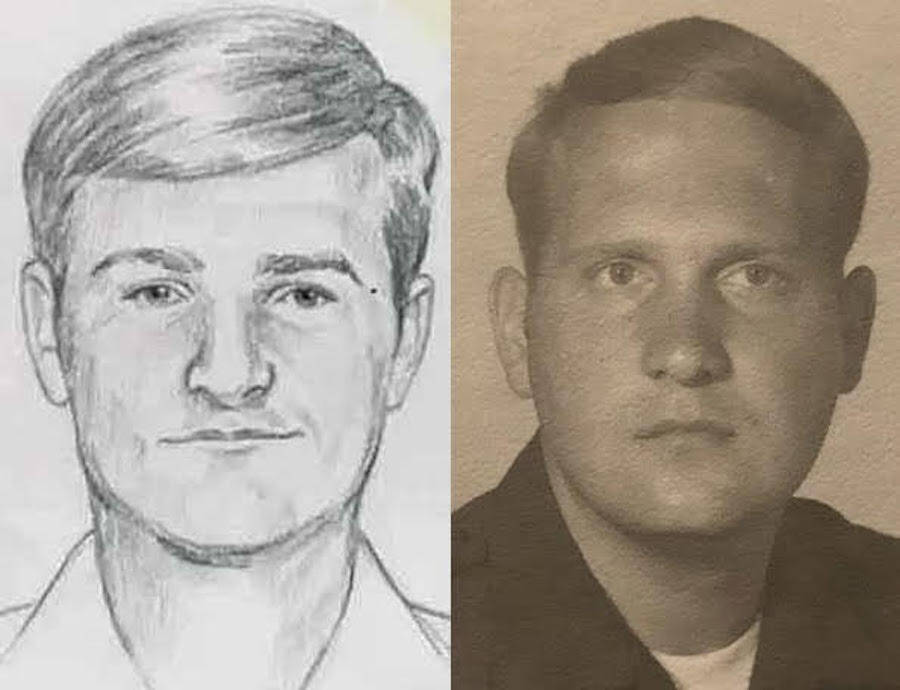
Public DomainGolden State Killer Joseph James DeAngelo hid in plain sight for decades while raping and murdering dozens of women — until he was finally caught in 2018.
The notorious Golden State Killer eluded authorities for more than four decades before police finally caught Joseph James DeAngelo in 2018. While some would expect a monster in handcuffs, Joseph James DeAngelo was a seemingly ordinary former police officer living near Sacramento who’d hidden in plain sight for more than 40 years.
The then-74-year-old was described by former co-workers as “a regular Joe,” despite his serious demeanor and nonexistent smile. But suddenly, in 2018, Joseph James DeAngelo was charged with the unspeakable crimes of the Golden State Killer.
The Golden State Killer committed at least 51 rapes and 13 murders across California throughout the 1970s and 1980s.
On June 29, 2020, Joseph DeAngelo pleaded guilty to 26 charges in a raping and killing spree. He was ultimately charged with 13 counts of murder, with additional special circumstances, as well as 13 counts of kidnapping for robbery.
Though the statute of limitations for the many rapes he’s accused of have expired, he received 11 consecutive life sentences for the crimes he did admit to (plus an additional life sentence and a further eight years), ensuring that he’ll eventually die in prison.
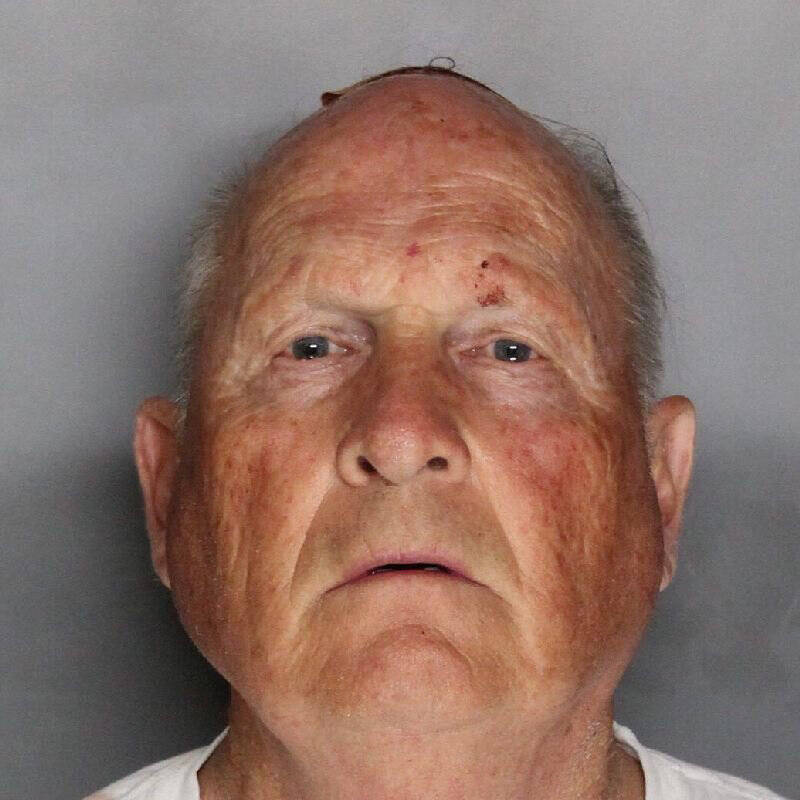
Sacramento County Sheriff’s OfficeJoseph James DeAngelo, a former police officer in California, pleaded guilty to 26 charges.
The Golden State Killer, who first struck Northern California as the East Area Rapist before moving south and becoming a prolific murderer known as the Original Night Stalker, was one of the worst serial killers in American history. So how could Joseph James DeAngelo, a retired and elderly family man who once wore a badge, have hidden such a dark secret?
Joseph James DeAngelo’s Early Life Before The Murders Began
Joseph James DeAngelo was born on November 8, 1945, in Bath, New York, but would spend most of his early life in the suburbs of Sacramento where he attended Folsom High School. His mother, a Denny’s waitress, would later move with him to Auburn after she married a traveling welder.
DeAngelo served in the Navy during the Vietnam War for about 22 months. He came back home a decorated vet, earning a National Defense Service medal, a Vietnam Service Medal, and a Vietnam Campaign Medal.
He attended Sierra College from 1968 to 1970, before starting at California State University, Sacramento in 1971. Joseph DeAngelo graduated with a bachelor’s degree in criminal justice in 1972.
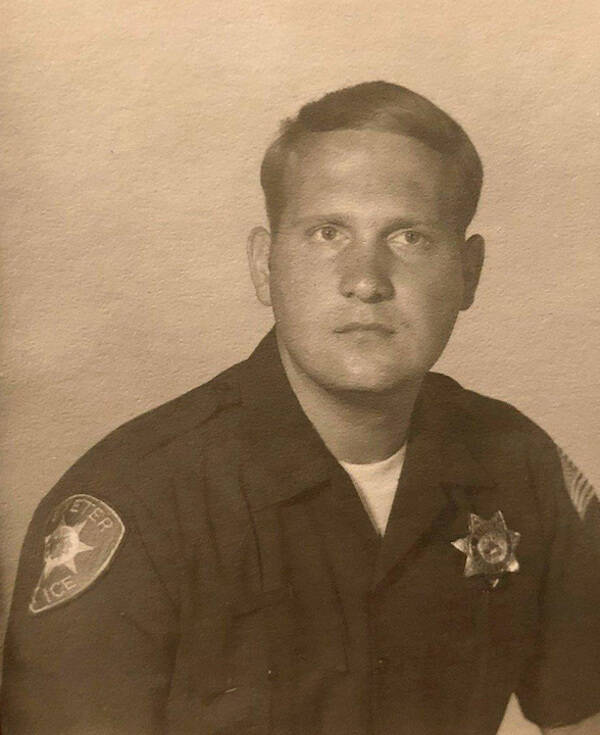
Santa Barbara County Sheriff’s OfficeGolden State Killer Joseph DeAngelo joined the Exeter Police Department in 1973, right before the Visalia Ransacker began burglarizing homes.
A neighbor said DeAngelo was pleasant and clean-cut in his youth but lost part of a finger while fighting in the war. In 1973, Joseph DeAngelo married Sharon Marie Huddle. Around the same time, he allegedly started either an internship or volunteer work with Roseville Police Department, though that department apparently “found no records” of him working there.
But Joseph DeAngelo definitely worked as a police officer in Exeter from 1973 to 1976, and then he worked for the Auburn Police Department from 1976 to 1979. He was let go from the latter job after he was charged with stealing a hammer and dog repellent from a drug store in Citrus Heights. But before he was caught shoplifting, the Golden State Killer seemed to be an upstanding guy.
The Exeter Sun‘s profile of DeAngelo in 1973 presented him as such:
“[DeAngelo] believes that without law and order there can be no government and with out a democratic government, there can be no freedom. Law enforcement is his career, he says, and his job is serving the community.”
Unfortunately, his background in criminal justice, knowledge of police investigation procedures, and experience in Vietnam may have only helped sharpen Joseph DeAngelo’s skills as a serial killer.
The Horrifying Crimes Of The Golden State Killer
The Visalia Ransacker crimes began in 1974, about a year after Joseph James DeAngelo joined the force in nearby Exeter. The unidentified criminal operated until 1975 and is estimated to have burglarized at least 100 homes. Typically, small items were stolen, while high-value objects were often left behind.
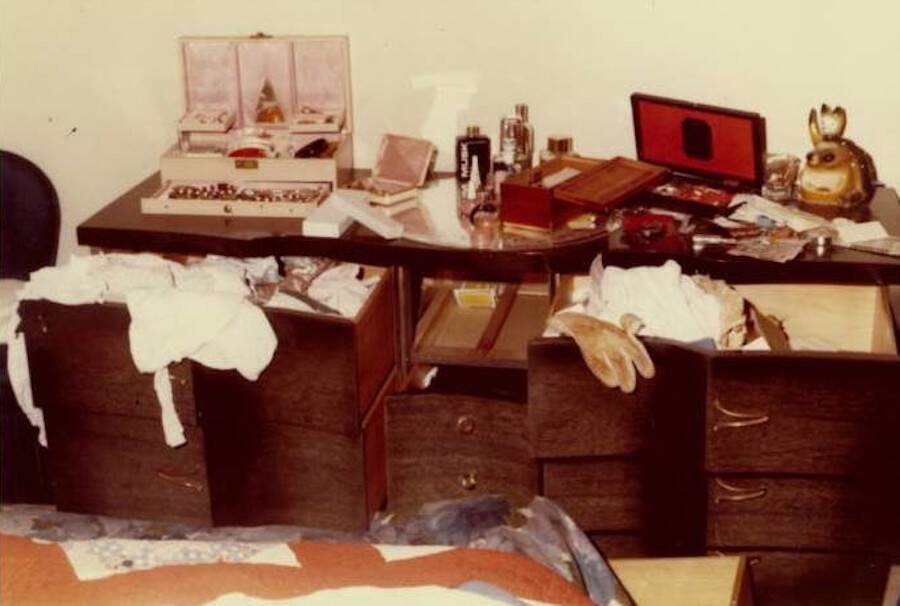
Public DomainOne of the bedrooms burglarized by the Visalia Ransacker.
The crime spree commonly saw women’s underwear get scattered around the homes. While this criminal was mostly known for his burglaries, it’s believed the Visalia Ransacker may have also been responsible for a murder during the same time period.
By 1976, the East Area Rapist, another name given to the Golden State Killer, was terrorizing the Sacramento area. The attacks often occurred in single-story homes inhabited by single women near practical escape routes.
The masked man often broke in beforehand, after he stalked his victims to memorize their routines, and left ligatures inside to use as bindings for later. He also unloaded any guns he found and unlocked sliding glass doors or windows. Eventually, he advanced to attacking couples.

Public DomainSize-nine shoe prints were commonly found at the crime scenes of the Golden State Killer and East Area Rapist.
After waking them with a gun and flashlight pointed in their faces, Joseph DeAngelo tightly bound the hands of his victims. He left the man face down and stacked dishes on his back, threatening to kill everyone in the house if he heard them rattle — before repeatedly raping the woman.
He was almost caught once, but fled on a bicycle — a preferred escape tactic of his. The attacks in that area appeared to end by 1979. At the time, the Visalia Ransacker and East Area Rapist, both monickers created by the press, were thought to be different individuals.
The police, too, saw no considerable ties in connecting the various aliases later known to all apply to the Golden State Killer. Unfortunately, they would all be similarly confounded by the appearance of the Original Night Stalker — the nickname given to a seemingly new killer in Southern California in 1979.
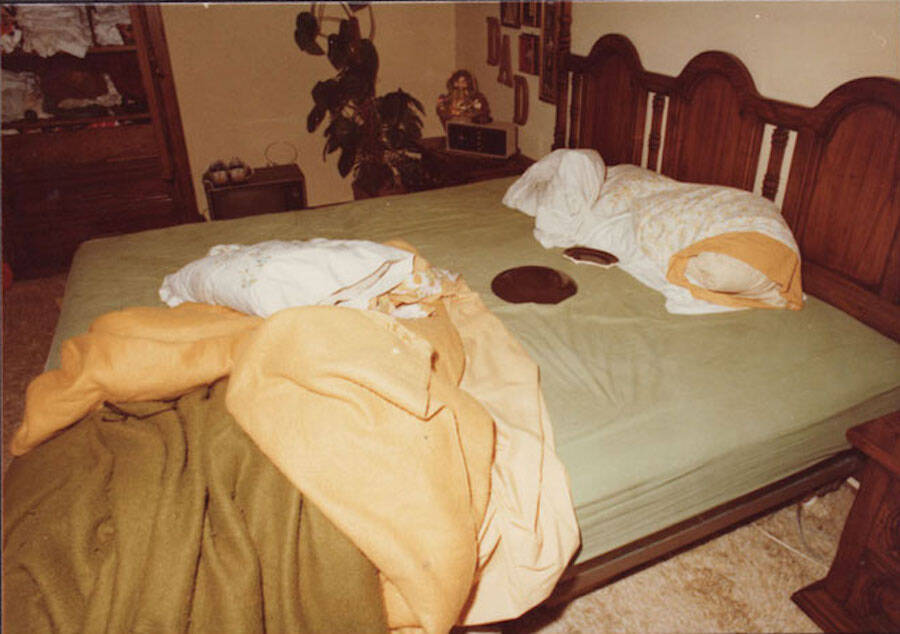
Public DomainBroken china found at one of the grisly crime scenes.
These incidents mirrored the East Area Rapist attacks in some ways, but ended in the bludgeoning or shooting of the victims. At least 10 people were killed at the hands of the Original Night Stalker.
It wasn’t immediately clear that the three criminals could be one and the same, all the work of Golden State Killer Joseph DeAngelo. But at several of these crime scenes, ligatures and similarly-sized shoe prints were discovered. Meanwhile, threatening phone calls were made to both victims and police. Unfortunately, DNA evidence had yet to be standardized and understood at that point in time.
Early Suspicions About The Identity Of The Golden State Killer
Three years after the last Original Night Stalker murder, Joseph DeAngelo started working as a truck mechanic at a Roseville distribution center for Save Mart groceries. His 27-year career there only ended with his retirement in 2017 — just a year after the FBI renewed its efforts to catch the man now known as the Golden State Killer.
He had lived in Citrus Heights as far back as 1983, with neighbor Cory Harvey confirming he was living with a daughter and granddaughter. Harvey was shocked at the arrest, as she simply knew DeAngelo as “Joe,” the old man who said retirement was a great opportunity to go fishing.
She also said Joe was an avid bike rider — and that he was a normal man “except for that quirkiness of getting mad.” Other neighbors saw this side of him more than the pleasant grandpa Harvey described.
“We used to just call him ‘Freak,'” said Natalia Bedes-Correnti, from a few doors down. “He used to have these temper tantrums, not at anybody, just [expressing] his self frustration.”
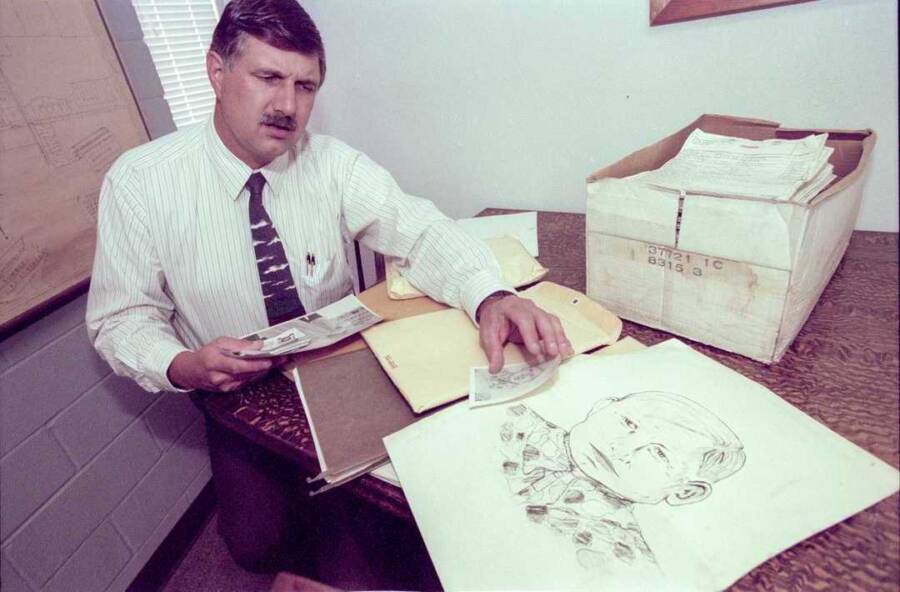
Johanna VosslerVisalia Police Captain Terry Ommen reviewing evidence in the Snelling murder case in 1996.
Perhaps most ominous was neighbor Eddie Verdon’s recollection of catching Joseph DeAngelo prowling on his property. “I had the creeps about this guy for a long time,” he said.
Investigations Into Joseph James DeAngelo
“Over the years, we heard of homicides down in Southern California, and we thought it was the East Area Rapist,” said Larry Crompton, a retired detective for the Contra Costa County Sheriff’s Department.
“But he would not leave fingerprints, so we could not prove, other than his M.O., that he was the same person. We did not know anything about DNA.”

Wikimedia CommonsA sketch of the Original Night Stalker, released by the FBI.
Indeed, until 2001 — when DNA tests confirmed that the East Area Rapist and the Original Night Stalker were linked — all police had were various sketches of the perpetrator based on survivors’ descriptions.
A few potential Golden State Killer suspects across the decades turned out to be dead ends, either having died in the 1980s before the final crimes were committed or being cleared by DNA in the 1990s.
With the recent advent of genealogy services combing enormous DNA databases, authorities were able to efficiently narrow their search by 2018. Using GEDMatch, police used DNA obtained from the decades-old crime scenes to create a profile.
In April of that year, Joseph DeAngelo’s name appeared as one of the results. When detectives obtained some of his DNA from the door handle of his car, they found it matched the DNA evidence left behind in the 1970s and 1980s.
It was Michelle McNamara, author of the Golden State Killer book I’ll Be Gone In the Dark — which has since been adapted into an HBO documentary — who suggested it would be DNA evidence that finally nabbed the killer in the end. Turns out she was right.
“We found the needle in the haystack and it was right here in Sacramento,” said Sacramento District Attorney Marie Schubert after his arrest.
Joseph James DeAngelo Faces Justice In The Golden State Killer Case
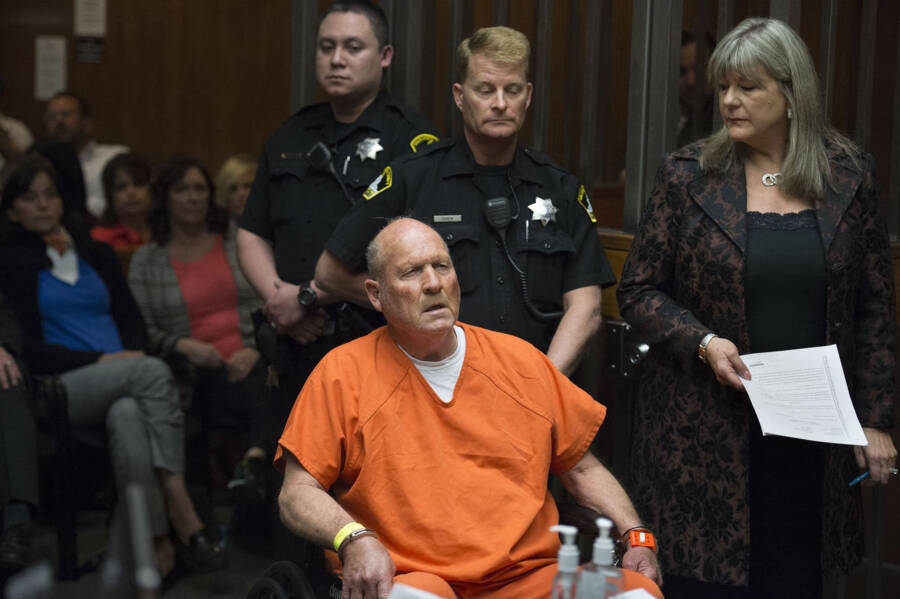
Randy Pench/Sacramento Bee/Tribune News Service/Getty ImagesJoseph James DeAngelo being arraigned in a Sacramento courtroom in April 2018.
After police arrested Joseph James DeAngelo in April of 2018, his long trip through the legal system began.
While the crimes occurred in six counties — Sacramento, Santa Barbara, Orange, Ventura, Tulare, and Contra Costa — DeAngelo was tried on multiple counts of murder in a single trial.
The pre-trial hearing saw Judge White permit the DNA evidence, and rule in favor of the prosecution’s request for additional cheek swabs from Joseph DeAngelo.
In January, the court entered a not-guilty plea on DeAngelo’s behalf, and rejected the defense’s request for more time to garner evidence before the trial progressed.
Although the COVID-19 pandemic delayed the May 12 preliminary hearing, the Golden State Killer trial was finally able to move forward in June. Eventually, Joseph DeAngelo pleaded guilty to 13 counts of murder as well as 13 counts of kidnapping in June.
Finally, in August, Joseph James DeAngelo received multiple life sentences. In the days before his sentencing, a number of his victims and others who knew him addressed the court, some breaking the silence they’d held for decades.
One woman who was bound by DeAngelo at age seven while he raped her mother said that he was “proof monsters were real. I had met the boogeyman.” The sister of another victim said simply, “May he rot in hell.”
If nothing else, Joseph DeAngelo’s life sentences certainly mean that the Golden State Killer will never see the light of day ever again.
After learning about Golden State Killer Joseph James DeAngelo, read about serial killer Edmund Kemper, whose story is almost too gross to be real. Then, read about Paul Holes, the investigator who helped track the Golden State Killer.
